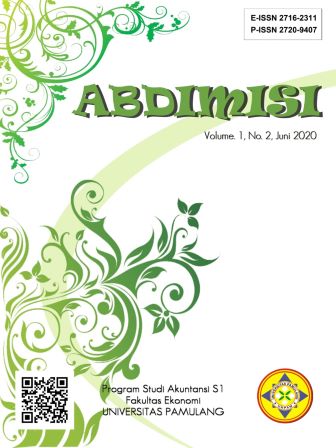MEMAJUKAN UKM CONFETTI DENGAN MEMANFAATKAN TEKNOLOGI DIGITAL
DOI:
https://doi.org/10.32493/abms.v1i2.6955Abstract
Our PKM partners are a family company engaged in the manufacture of T-shirt sheets, which have the trademark "confetti" in Depok area. The problems they face include their limited expertise in utilizing technology for marketing, overlapping employee job descriptions, and financial management which only uses simple bookkeeping.The approach method used in PKM activities is brainstorming to open a mindset about the importance of more professional business management, teaching technology that supports marketing, and making correct financial reports. The solutions offered include proposing the use of current technology, compiling an organizational structure with job description of each role and teaching how to prepare proper financial reports.
Keywords: Financial management Digital Marketing, SAAS.
References
Buttle, F. (2009). Customer relationship management: Concepts and technology. In: Sydney: a Butterworth-Heinemann Title.
Chaffey, D., & Ellis-Chadwick, F. (2019). Digital marketing: Pearson UK.
Costa, S. H. (2018). Consequence of Management Information System In Organizational Profit, Labor And Investment.
Dewi, L. P. (2019). Implementasi Peraturan Presiden Nomor 13 Tahun 2018 dalam Pendirian Perseroan Terbatas. Acta Comitas: Jurnal Hukum Kenotariatan, 4(1), 1-10.
Edmonds, T. P., Tsay, B.-Y., & Olds, P. R. (2011). Fundamental managerial accounting concepts: McGraw-Hill.
Evans, D. (2010). Social media marketing: the next generation of business engagement: John Wiley & Sons.
Indonesia, B. (2015). Profil bisnis usaha mikro, kecil dan menengah (UMKM). Kerjasama Lembaga Pengembangan Perbankan Indonesia (LPPI) dengan Bank Indonesia.
Indonesia, R., & Dasar, U.-U. (1995). Undang Undang No. 9 Tahun 1995 Tentang: Usaha Kecil. Sekretariat Negara. Jakarta.
Indonesia, R., & Keputusan Presiden, R. No. 99 Tahun 1998 tentang Bidang. Jenis Usaha yang dicadangkan untuk Usaha Kecil dan Bidang/Jenis Usaha yang Terbuka untuk Usaha Menengah atau Usaha Besar dengan Syarat Kemitraan.
Kingsnorth, S. (2019). Digital marketing strategy: an integrated approach to online marketing: Kogan Page Publishers.
Kotler, P., & Armstrong, G. (2013). Principles of Marketing (16th Global Edition). In: Harlow: Pearson.
Kristiyanti, M. (2012). Peran strategis usaha kecil menengah (UKM) dalam pembangunan nasional. Majalah Ilmiah Informatika, 3(1), 63-89.
Kurnia, S. (2006). E-commerce adoption in developing countries: an Indonesian study. Paper presented at the San Diego international systems conference.
Maradina, J., Shanti, Y. K., Nadi, L., Kusumawardhany, S. S., & Damayanti, R. J. A. (2019). Pemanfaatan Teknologi Untuk Mendukung Kesejahteraan Keluarga Dengan Berwirausaha. Abdimisi (1), 47-54.
Odom, S. (2015). SEO for 2016: The complete do-it-yourself SEO guide.
Omidvar, M. A., Mirabi, V. R., & Shokry, N. (2011). Analyzing the impact of visitors on page views with Google analytics. arXiv preprint arXiv:1102.0735
Porter, M. E. (2011). Competitive advantage of nations: creating and sustaining superior performance: simon and schuster.
Rossiter, J. R. (2014). ‘Branding’explained: Defining and measuring brand awareness and brand attitude. Journal of Brand Management, 21(7-8), 533-540.
Ryan, D. (2016). Understanding digital marketing: marketing strategies for engaging the digital generation: Kogan Page Publishers.
Suci, Y. R. (2017). Perkembangan UMKM (Usaha mikro kecil dan menengah) di Indonesia. Cano Ekonomos, 6(1), 51-58.
Turban, E., & Volonino, L. (2012). Information Technology For Management 5th Edition: Wiley.
Waldow, D., & Falls, J. (2012). The Rebel's Guide to Email Marketing: Grow Your List, Break the Rules, and Win: Que Publishing.
Wankel, C., & Stoner, J. A. (2009). Management education for global sustainability: IAP.
Wibawa, S. (2017). Tridharma Perguruan Tinggi (Pendidikan Dan Pengabdian Kepada Masyarakat). Disampaikan dalam Rapat Perencanaan Pengawasan Proses Bisnis Perguruan Tinggi Negeri. Yogyakarta, 29, 01-15.
Downloads
Published
Issue
Section
License
Copyright Notice
Authors who publish with this journal agree to the following terms:
- Authors retain copyright and grant the journal right of first publication with the work simultaneously licensed under a Creative Commons Attribution License that allows others to share the work with an acknowledgement of the work's authorship and initial publication in this journal.
- Authors are able to enter into separate, additional contractual arrangements for the non-exclusive distribution of the journal's published version of the work (e.g., post it to an institutional repository or publish it in a book), with an acknowledgement of its initial publication in this journal.
- Authors are permitted and encouraged to post their work online (e.g., in institutional repositories or on their website) prior to and during the submission process, as it can lead to productive exchanges, as well as earlier and greater citation of published work (See The Effect of Open Access).
Abdimisi have CC-BY-SA or an equivalent license as the optimal license for the publication, distribution, use, and reuse of scholarly work.
In developing strategy and setting priorities, Abdimisi recognize that free access is better than priced access, libre access is better than free access, and libre under CC-BY-SA or the equivalent is better than libre under more restrictive open licenses. We should achieve what we can when we can. We should not delay achieving free in order to achieve libre, and we should not stop with free when we can achieve libre.
You are free to:
- Share — copy and redistribute the material in any medium or format
- Adapt — remix, transform, and build upon the material for any purpose, even commercially.
- The licensor cannot revoke these freedoms as long as you follow the license terms.

